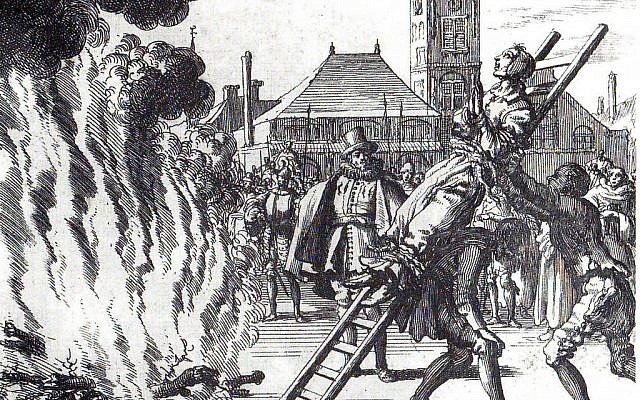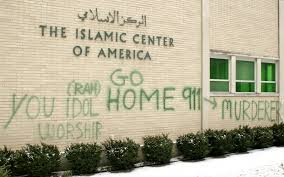Social identity threat
and religion in the US
Penn State
 When people feel
targeted because of their religious identity, they can experience a
psychological threat that may undermine psychological well-being and increase
prejudice toward other groups, according to a new study by Penn State
psychologists.
When people feel
targeted because of their religious identity, they can experience a
psychological threat that may undermine psychological well-being and increase
prejudice toward other groups, according to a new study by Penn State
psychologists.
The findings, which
appear online in the journal of Social Psychological and Personality
Science, suggest that in the United States, highly religious Protestants
and religious minorities -- Jews and Muslims -- feel the most targeted for
their religious group membership and religious beliefs.
This perception, which the researchers term "religious threat," leads people to feel socially isolated, be less comfortable sharing their religion with others and to be more likely to hold prejudiced attitudes towards others.
This perception, which the researchers term "religious threat," leads people to feel socially isolated, be less comfortable sharing their religion with others and to be more likely to hold prejudiced attitudes towards others.
"American society
is in a downward spiral of interreligious intolerance," said Michael
Pasek, a doctoral student in social psychology and the lead investigator on the
research.
 "When people see their religion or religious beliefs mocked in
the public domain or criticized by political leaders, these experiences signal
to members of entire religious groups that they don't belong."
"When people see their religion or religious beliefs mocked in
the public domain or criticized by political leaders, these experiences signal
to members of entire religious groups that they don't belong."
The first large study
examining social identity threat and religion in the United States, the survey
recruited 970 participants from 44 states and the District of Columbia.
Participants were between 18 and 88 years old and were demographically diverse.
The survey included questions about participants' religion and religiosity, as well as a host of psychological measures assessing the degree to which individuals felt targeted, stigmatized or threatened because of their religion. Measured psychological outcomes included belonging, identity concealment, and intergroup attitudes.
The survey included questions about participants' religion and religiosity, as well as a host of psychological measures assessing the degree to which individuals felt targeted, stigmatized or threatened because of their religion. Measured psychological outcomes included belonging, identity concealment, and intergroup attitudes.
Survey results also
revealed that highly religious people feel heightened threat. This was
particularly true for Christians.
Among those sampled, 46 percent of highly religious Protestants reported that it was "somewhat" to "very" true that they felt targeted because of their religion.
In contrast, only 2 percent of Protestants low in religiosity felt targeted. "Our findings suggest that religiosity itself is highly stigmatized in American society," said Pasek.
Among those sampled, 46 percent of highly religious Protestants reported that it was "somewhat" to "very" true that they felt targeted because of their religion.
In contrast, only 2 percent of Protestants low in religiosity felt targeted. "Our findings suggest that religiosity itself is highly stigmatized in American society," said Pasek.
Interestingly, among
highly religious respondents, Protestants reported feeling just as targeted as
Muslims and Jews did, though there may be different causes of religious threat
for these groups, the researchers suggest.
For religious minorities, the threat may emanate from prejudice and discrimination, they said, whereas for Christians, the threat may come from concerns that their status and influence is dropping as the percentage of Americans who identify as Christian drops.
No matter the cause, the psychological effects of religious threat were generally consistent, they added.
For religious minorities, the threat may emanate from prejudice and discrimination, they said, whereas for Christians, the threat may come from concerns that their status and influence is dropping as the percentage of Americans who identify as Christian drops.
No matter the cause, the psychological effects of religious threat were generally consistent, they added.
According to the
researchers, religious threat experiences are likely to increase as the nation
becomes more religiously diverse and as secularism becomes more mainstream.
This may explain why many religious Christians express concern that there is a war on religion in the United States, they said. It also may help explain why hostility towards religious minority groups is increasing.
This may explain why many religious Christians express concern that there is a war on religion in the United States, they said. It also may help explain why hostility towards religious minority groups is increasing.
"One takeaway
from our research is that the public discourse around religion and other
identity groups matters," said Jonathan Cook, assistant professor of
psychology who worked on the study.
"If the United States is to continue to be a place of religious freedom and tolerance, important conversations need to happen that acknowledge the changing religious landscape of the American population, without fanning the flames of religious intolerance."
"If the United States is to continue to be a place of religious freedom and tolerance, important conversations need to happen that acknowledge the changing religious landscape of the American population, without fanning the flames of religious intolerance."